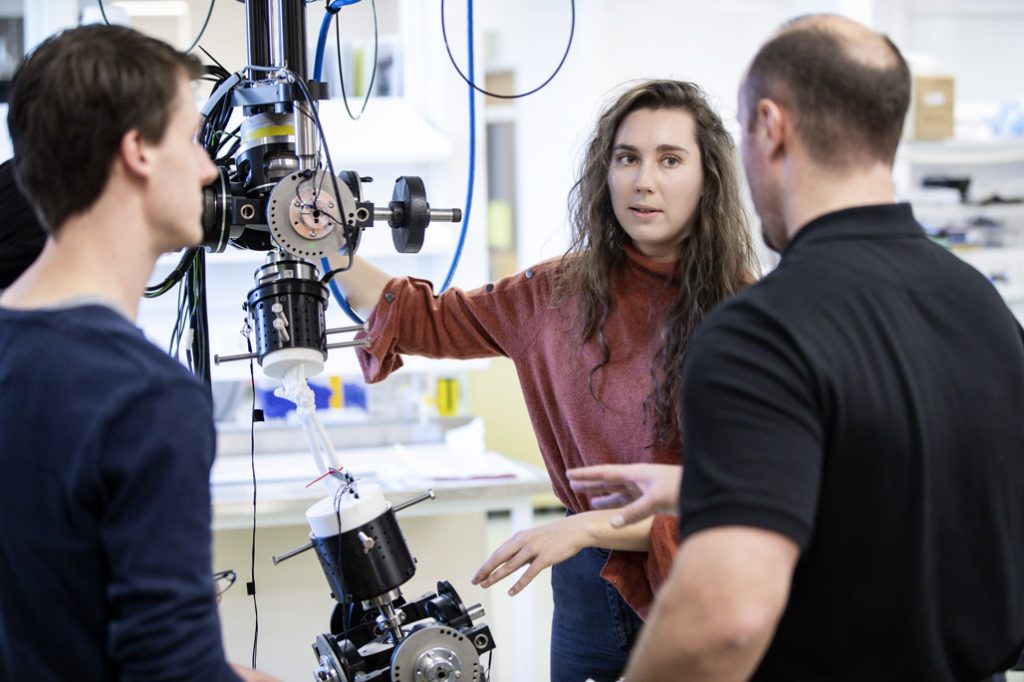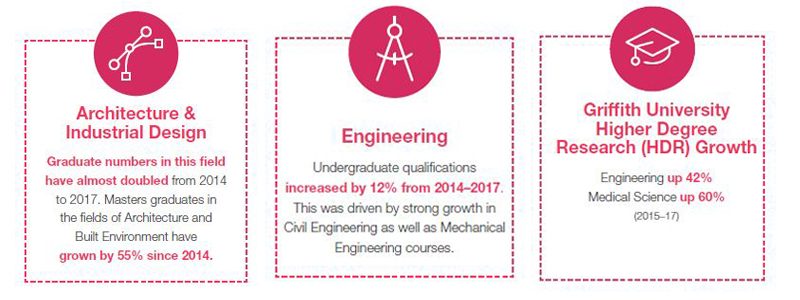
Leading global innovators and technology-focused businesses can be assured of a growing workforce of qualified and entrepreneurial professionals to support their new horizons in the Gold Coast Health and Knowledge Precinct.
Analysis by KPMG of recent local graduate trends demonstrates a rapidly growing pipeline of skilled workers, and together with course and program innovation by Gold Coast education providers, promises a fertile environment for talent attraction and retention and entrepreneurial innovation.
Graduate numbers in STEM fields including health now account for 65% of total graduate numbers, with science, engineering, ICT, architecture and industrial design graduates accounting for 36% of the total, according to the analysis commissioned by the GCHKP Project Office, with Study Gold Coast and Regional Development Australia (RDA) Gold Coast (download fact sheet- –GCHKP Workforce 2019_WEB)

Responding to increasing demand for higher-level skills and specialised credentials there has been strong growth in post-graduate qualifications, including significant increases in HDR qualifications in engineering and medicine at Griffith University.

Growing trend towards specialisation
With core, multi-disciplinary and ‘soft’ skills such as communication and collaboration all highly valued, there’s also a growing trend towards knowledge specialisation to cater to emerging fields in the digital, Industry 4.0 era. Griffith University, and the city’s other universities and education providers are responding with specialty degree majors in areas such as electronic UAV engineering and micro-credentials designed to directly address industry needs.
And in an increasing number of cases, industry-focused specialist expertise is being honed through PhD research that has direct commercial translation. Industrial Digital Design PhD candidate Kaecee Fitzgerald is working in a collaborative team as part of a $900,000 BioMedTech Horizon’s project with industry, led by Griffith University.
Working with clinical lead, orthopaedic surgeon Professor Randy Bindra, biomedical engineers Professor David Lloyd and Dr David Saxby, and fellow Phd candidate in Mechanical Engineering Robotics) Alistair Quinn, Kaecee’s role is to match 3D design technology and materials with clinical and engineering requirements to create artificial wrist ligament.
“It is unusual to have a PhD that is so genuinely practical,” says Kaecee.
“I get a little bit bored if I’m just working in one discipline, so I love to get all the different perspectives and be able to bring them together as we progress the design. It’s a slow process that can be tedious, but when it works its euphoric.”

New and innovative courses
Examples of new and innovative programs include:
- Bachelor of Intelligent Digital Technologies (Griffith)
- Bachelor of Data Science (Griffith)
- Master of Electronic and Sports Engineering (Griffith)
- Master of Biotechnology (Griffith)
- Master of Healthcare Innovations (Bond University)
- Master of Business Data Analytics (Bond University)
- Master of Actuarial Sciences (Bond University)
- Bachelor of Digital Business (Southern Cross University)
- Bachelor of Podiatry/Pedorthics (Southern Cross University)
- Certificate IV in Cyber Security (Gold Coast TAFE)
Talent attracts talent
With a 10,000 strong workforce already within the Precinct, talent is drawn from all over the world, with rich, multidisciplinary research opportunities, a collaborative, commercially-focused environment and entrepreneurial culture, as well as an enviable lifestyle all key factors in attracting top global talent.
Professor Johnson Mak is a prominent HIV researcher who has held a range of appointments including the Peter Doherty Fellowship, Monash Fellowship, Pfizer Fellowship and the ARC Future Fellowship.
“I was a Hong Kong born Canadian and I trained in Canada and came to Australia, to Melbourne, about 20 years ago. The thing that attracted me to the Gold Coast, and the Institute for Glycomics in particular, is the strong collaboration and translational focus – they have a great business team to bring discoveries from bench to bedside.”
Professor Mak, his team and collaborators are taking a Glycomics approach to HIV, probing the role glycans or sugars play in helping the virus, with a view to new antiviral treatments.
Global 3D printing software pioneers Materialise recently located their Australian HQ to the GCHKP, lured by collaborative R&D opportunities and an entrepreneurial culture that is part of the Gold Coast DNA.
The innovation ecosystem is nurtured by the City and universities with various entrepreneurship and start-up programs and incubation facilities, including the exciting new co-working and innovation space in the Precinct, COHORT.
Materialise was attracted to the Gold Coast Health & Knowledge Precinct due to the long term
vision of the precinct, the strong support from the city, the research strengths of Griffith University and the relevant skills and expertise being developed on the Gold Coast in the fast-moving 3D printing software arena.
As a Queensland graduate, it’s great to be able to locate our Australian HQ here and employ our growing workforce from the local skills base.
Maddie McIntyre, Business Manager, Materialise Australia
